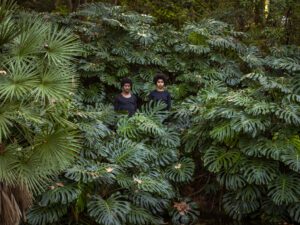Mónica de Miranda is drawn back to Angola’s modernist architecture in her latest work, Panorama (2017). Reminiscent of previous series Hotel Globo (2014-2015), Panorama uses the backdrop of an abandoned hotel on Ilha do Cabo to consider the multiple geographies and histories of Luanda. Back in its prime, the Hotel Panorama would entice guests to come from the city to experience views of the bay and ocean beyond; today it represents Angola’s troubled past. Key to the project is Miranda’s concern for Luanda’s architectural heritage that has been increasingly replaced with gentrified high-rise luxury buildings. As with Hotel Globo, Panorama highlights the city’s changing patterns – from colonial to post-independence, post-Cold War and post-civil war – to propose a reimagining of the complexity of its layered present to obtain a different future.
Based in Lisbon, Miranda is an artist of Angolan descent whose photography and mixed media based work deals with themes of geography and identity, expressing meditative visions of personal history and exploring the poetics of belonging. Panorama lends its title to a new exhibition at Tyburn Gallery, London, the artist’s first solo show at the venue. As well as drawing on Luanda’s Hotel Panorama, this layered title refers to the ownership and power implied by the construction of views of landscapes. Throughout the presentation are visions of Angola’s past and present as witnessed through its architectural geography: hotels, swimming pools and cinemas which once served as monuments to colonial leisure are being reclaimed by nature.
The photographic works in Panorama are transformed into immersive installations: the surface of Miranda’s images are also enriched by wax and pigment. Two protagonists punctuate various scenes and lead the viewer into a non-linear, but visually-lush and historically rich journey. These cryptic, twinned characters evoke a multiplicity of selves, or a mirroring of self and other. Together with the surrounding architecture, they reveal the sense of duality inherent in the experience of migration and diaspora. Mixed emotions of nostalgia and alienation are expressed through images of spaces both domestic and public, in and around the capital of Luanda, as well as in Malanje, the city east of Luanda where the artist’s mother grew up.
Mónica de Miranda, Panorama, until 13 July, Tyburn Gallery, London.
Visit: www.tyburngallery.com.
For the latest news in contemporary art and culture, follow us on Facebook, Twitter and Instagram.
Credits
1. Mónica de Miranda, Swimming pool, 2017, Inkjet print, 100 x 70 cm, Copyright the artist. Courtesy Tyburn Gallery.





